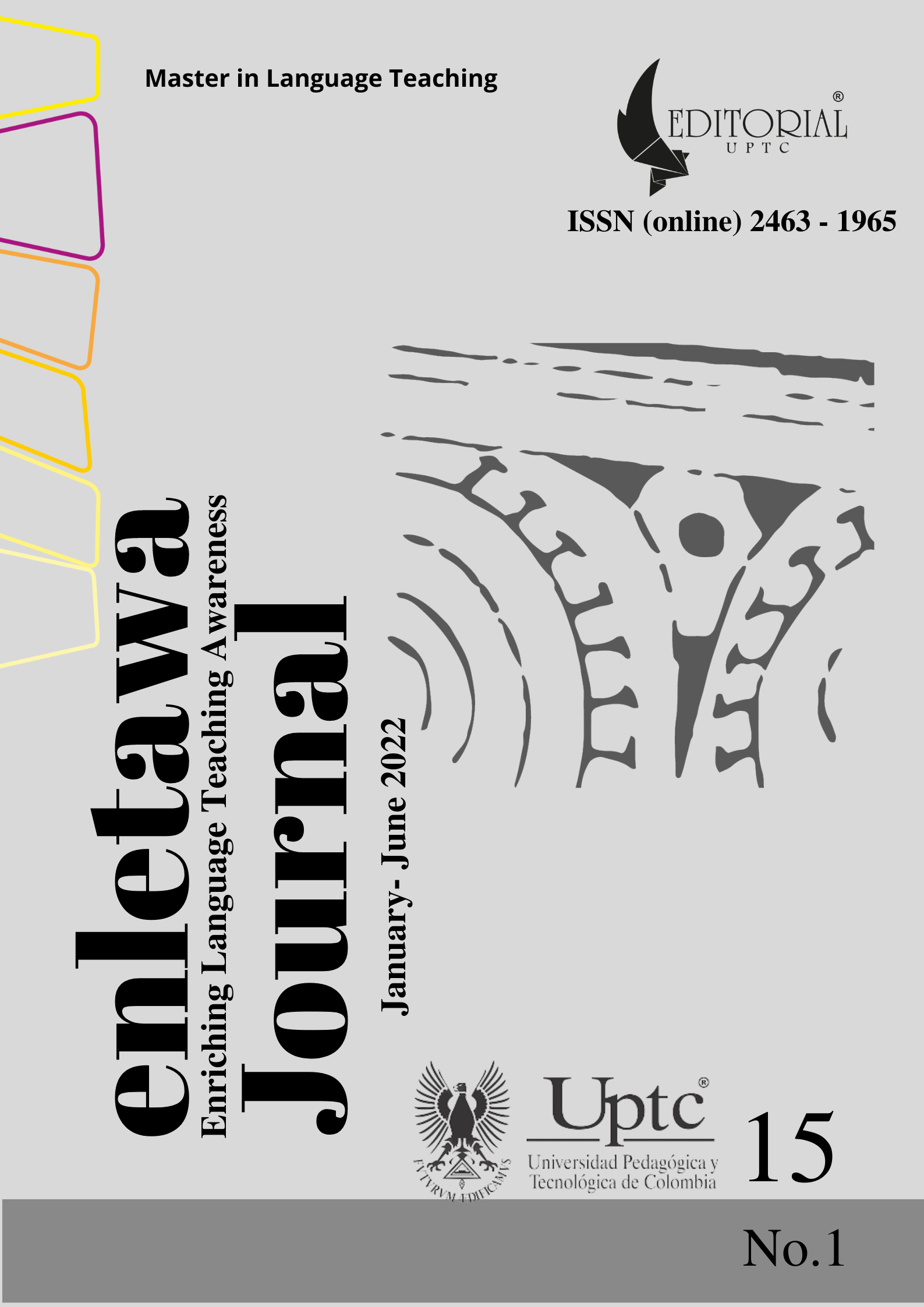Virtual Learning Communities: A Contribution to the Pre-Service Teachers’ Learning

Abstract
This paper presents the pre-service teachers’ learning of didactics and language teaching methodologies during their participation in a virtual learning community. Three main concepts were defined: Virtual Learning Communities (VLCs), reflective practice, and learning from a sociocultural perspective. 25 pre-service teachers from a bachelor’s degree in language teaching participated in the VLC. A focus group and the pre-service teacher’s reflection in the VLC were used to collect information. The results show pre- service learned to reflect on and use effective teaching materials; to select, adapt and combine language teaching methodologies, and to criticize themselves, their lessons plan, and their performance in order to improve their teaching practice.
Keywords
Learning, reflective practice, virtual learning communities
Author Biography
Catalina Herrera Mateus
Magister in Education, Academic Coordinator, Corporación Universitaria Minuto de Dios
Brenda Julieth Herrera Varela
Bachelor Degree in Language Teaching, Academic Coordinator, Passport Language Center
John Jairo García Arjona
Bachelor Degree in Language teaching, Language teacher, Corporación Universitaria Minuto de
Dios
References
- Benavides, W. I. (2012). El aprendizaje colaborativo en ambientes virtuales. En Blanco y Negro, 3(1), 42-47.
- Borg, S. (2006). Teacher Cognition and Language Education: Research and Practice. Continuum.
- Botero, L. (2013). La influencia de las comunidades virtuales de aprendizaje en los idiomas. Bachelor's thesis. Universidad EAN, Bogotá, Colombia. https://repository.universidadean.edu.co/handle/10882/4124
- Bozu, Z., & Imbernon-Muñoz, F. (2009). Teaching Portfolios as a Formative Strategy for a Reflective Practice on Beginner University Professors. Revista d'Innovació i Recerca En Educació, 2(2), 61-73. https://doi.org/10.1344/reire2009.2.2224
- Cote, G. E. (2012). The Role of Reflection During the First Teaching Experience of Foreign Language Pre-Service Teachers: An Exploratory Case Study. Colombian Applied Linguistics Journal, 14(2), 24-34. DOI: https://doi.org/10.14483/udistrital.jour.calj.2012.2.a02
- Dillenbourg, P. (1999). What Do you Mean by Collaborative Learning. In Collaborative Learning: Cognitive and Computational Approaches (pp.1-16). Elsevier.
- Farrell, T. S. C. (2007). Reflective Language Teaching: From Research to Practice. Continuum.
- Gardner, H., & Moran, S. (2006). The Science of Multiple Intelligences Theory: A Response to Lynn Waterhouse. Educational Psychologist, 41(4), 227-232. DOI: https://doi.org/10.1207/s15326985ep4104_2
- Hernández, J. (2014). Virtual Communities as a Learning Tool of Foreign Languages. Universidad de Valladolid. http://uvadoc.uva.es/handle/10324/6991
- Insuasty, E., & Zambrano Castillo, L. C. (2010). Exploring Reflective Teaching Through Informed Journal Keeping and Blog Group Discussion in the Teaching Practicum. Profile Issues in Teachers Professional Development, 12(2), 87-105.
- Johnson, K. E. (2009). Second Language Teacher Education: A Sociocultural Perspective. Routledge. DOI: https://doi.org/10.4324/9780203878033
- Johnson, K. E., & Golombek, P. R. (Eds.). (2011). Research on Second Language Teacher Education: A Sociocultural Perspective on Professional Development. Routledge.
- Juliao, C. G. (2011). El enfoque praxeológico [Praxeological approach]. Corporación Universitaria Minuto de Dios.
- Morrison, K. (1996). Developing Reflective Practice in Higher Degree Students Through a Learning Journal. Studies in Higher Education, 21(3), 317-332. DOI: https://doi.org/10.1080/03075079612331381241
- Ortega, M., Leal, O. & Herrera, C. (2016). Comunidades de aprendizaje y prácticas pedagógicas. Boletín Redipe, 5(9), 137-145.
- Osmanović, J. (2019). The Perspective of Cognitive Thinking and Reflective Teaching Practice. International Journal of Cognitive Research in Science, Engineering and Education, 7(2), 1. DOI: https://doi.org/10.5937/IJCRSEE1902001M
- Pietkiewicz, I., & Smith, J. A. (2014). A Practical Guide to Using Interpretative Phenomenological Analysis in Qualitative Research Psychology. Psychological journal, 20(1), 7-14. DOI: https://doi.org/10.14691/CPPJ.20.1.7
- Pritchard, A. (2018). Ways of Learning: Learning Theories for the Classroom. Routledge. DOI: https://doi.org/10.4324/9781315460611
- Schön, D. (1987). The Reflective Practitioner (6th ed.), McGraw-Hill.
- Skinner, B. F. (1985). Cognitive Science and Behaviourism. British Journal of psychology, 76(3), 291-301. DOI: https://doi.org/10.1111/j.2044-8295.1985.tb01953.x
- Small, R. (1997). Motivation in Instructional Design. Eric Clearinghouse on Information and Technology.
- Tosta, A. L. (2001). Laugh and Learn: Thinking Over The “Funny Teacher Myth”. English Teaching Forum, 39(1), 26-28.
- Valsineer, J. (1987). Culture and the Development of Children’s Actions: A Cultural–Historical Theory of Developmental Psychology. John Wiley & Sons.
- Vygotsky, L. (1978). Mind in Society: The Development of Higher Psychological Processes. Harvard University Press.
- Witherspoon, E. B., Ferrer, N. B., Correnti, R. R., Stein, M. K., & Schunn, C. D. (2021). Coaching that Supports Teachers’ Learning to Enact Ambitious Instruction. Instructional Science: An International Journal of the Learning Sciences, 49, 877-898. https://doi.org/10.1007/s11251-021-09536-7 DOI: https://doi.org/10.1007/s11251-021-09536-7
- Xingfeng Huang, Mun Yee Lai, & Rongjin Huang. (2021). Teachers’ Learning Through an Online Lesson Study: An Analysis from the Expansive Learning Perspective. International Journal for Lesson & Learning Studies, 10(2), 202-216. https://doi-org.ezproxyegre.uniandes.edu.co:8843/10.1108/IJLLS-09-2020-0076 DOI: https://doi.org/10.1108/IJLLS-09-2020-0076
- Zahid, M., & Khanam, A. (2019). Effect of Reflective Teaching Practices on the Performance of Prospective Teachers. TOJET The Turkish Online Journal of Educational Technology, 18(1). http://www.tojet.net/articles/v18i1/1814.pdf
